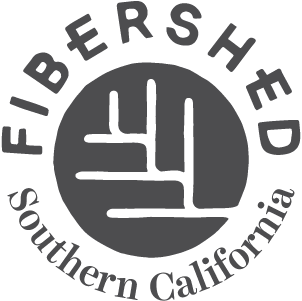AUTHOR TALK: REBECCA BURGESS IN LOS ANGELES
Rebecca Burgess, founder of Fibershed, joined us at the Helms Design Center in Culver City on Thursday, January 30th to share her latest book, Fibershed: Growing a Movement of Farmers, Fashion Activists, and Makers for a New Textile Economy. We gathered a standing room only crowd of activists, sustainable and conscious consumers, fashion brands, farmers, shepherdesses, and artisans, for an inspiring and action-oriented talk on the challenges and opportunities we face creating local fibersheds. The talk was introduced by Lesley Roberts, lead for the Southern California Fibershed affiliate, and moderated by Kaméa Chayne, host of Green Dream Podcast and curator of ConsciousFashion.co.
Among the attendees were representatives of Fashion Revolution – the global movement for transparency in fashion and one of the evening’s promotional sponsors, a cohort from Textile Arts | LA – the event’s financial sponsor, as well as movers and mavens in the sustainable and circular fashion communities in LA, including Christina Johnson, founder of Upcycle it Now; Jennifer Gilbert, Chief Marketing Officer of I:CO; and Jennie McGuirk, founder of Brilliant Collective. We spotted Sharon Donnan, who is spearheading a project with Acadian Brown Cotton in the Acadian Fibershed, Brittany Cole Bush of Grazing School of the West and Shepherdess Holistic Hides, Kristine Upesleja of Madisons Innovative, Kathleen Blakistone of Moonwater Farm, artisans and local brands Liz Spencer of The Dogwood Dyer, Jo Arellano of KKIBO, Cathy Callahan, and Nicole Livingstone of LookoutandWonderland, as well as in-house design teams from Outerknown and Lucky, and too many more to list. Suffice to say, the Los Angeles community is on board and eager for action.
The mission of the Fibershed organization as a whole is to “develop regional fiber systems that build soil and protect the health of our atmosphere.” Burgess explained the relationship between agriculture and fashion, and how this seemingly unlikely nexus is at the core of a healthier planet and a more sustainable attitude towards textiles. In fact, “Clothes can become a carbon solution, if you care about the landscape,” she maintains, essentially refuting the ingrained talking point of many environmental activists that fashion development and consumerism are evils to suppress. Rebecca asserts that unregulated textiles ¬– especially through the phases of dyeing and finishing – are often quicksands of toxic chemicals, and a leading contributor to harmful effects, such as soil exhaustion and endocrine disruption. The treatment and processing of textiles dependent on fossil fuels for yarns or dyes (think: denim), are known to cause a variety of maladies ranging from cancers in humans and animals to depletion of fresh aquifers, leading to catastrophic effects on the livelihood of local human communities and entire ecosystems. However, textiles can also represent a solution. The important message is that, although “agroforestry contributes to more than half of carbon emissions,” we have an incredible opportunity to reintroduce carbon into the soil, divesting from fossil carbon, and turning instead to regenerative and organic sources with the help of biomimetic agriculture.
Another interesting takeaway from Burgess’s intense, impactful talk is that being an eco-conscious consumer and maker – be it a farmer or a designer or a scientist – does not necessarily mean wearing and working with burlap and home-grown hemp fibers. Technology and high-level research are – and should be – continuously involved in the progress of sustainable fashion. Some tech-bio firms came up with dyes extracted humanely and ethically from bacteria, while others are utilizing government grants and private equity to bring to scale new methods of dealing with deadstock fabrics and to make circularity more available to markets across the globe. Part of the solution is that we need more manufacturing systems in place to help us manage the waste we have created in the name of speed and efficiency. Private corporations and technology have been the catalysts for many of the problems we face today, but there is a tremendous opportunity for them to offer us the tools to reverse the impending cataclysm.
The Q&A session led to more insights: we can all bring about change: from designers producing only what the market demands, to factories switching to zero-waste pattern making and cutting, to agrarians formulating ways to achieve efficient dry farming, to consumers curating their wardrobe in a more sensible manner, so long as we begin by developing our resources through transparent and ethical relationships.
The So Cal Fibershed launched in late 2019, and we are poised to move through 2020 as a year with ambitious priorities and incredible opportunities: creating connection, disseminating and acquiring information, and forging solid project partnerships. We hope you will join us in this momentous effort, and that together we can create the world we want to live in. Lesley likes to remind us of Buckminster Fuller’s quote, “We are called upon to be the architects of the future, not its victims.”
For a copy of Rebecca Burgess’s book, please visit your local independent bookstore, and please visit our website to check the event calendar, join as a producer or friend, submit calendar events, and sign up for the monthly newsletter.



